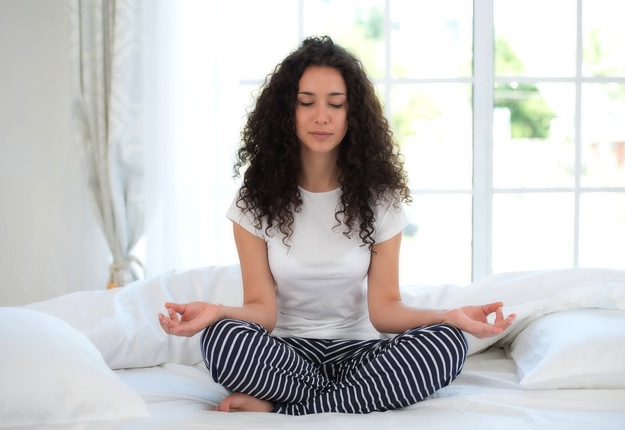While meditation is a journey, rather than a destination, a little guidance can help you navigate your way.
We’ve discussed the many benefits of meditation and taken a look at how you can incorporate this practice into your everyday life.
Now let’s review what a typical meditation session might consist of, as we embark on our journey:
1) Take your seat
To begin your practice, come to a comfortable seated position and ensure that your spine is long.
It is important to maintain length through the spine, as this allows the breath to flow smoothly.
A dignified posture is also the physical manifestation of what we are trying to cultivate internally – a sense of steadiness and equanimity.
You can either sit in a chair or on the floor. If you use a chair, choose one that has a straight back and ensure that your feet are flat on the floor.
If you sit on the floor, sit on a firm cushion so your hips are above your knees. Once you find an appropriate position, relax your shoulders and settle your hands in a way that feels comfortable. You might like to place them on your knees, or rest them gently in your lap.
If you would like to set your timer, now is the time; start with 3-5 minutes of actual meditation time, and build from there.
2) Start with your breath
Notice the actual physical sensations of the breath, the rhythm of your breathing and how it moves your belly.
You might also notice some movements of your chest. Bring your awareness to the air as it enters your nostrils – its temperature and any sensations as it flows in. Observe the breath as it flows towards your throat, then down your windpipe and enters your lungs.
Sense any movement that may occur in your chest, ribs and belly. Bring your attention to the little pause between the inhalation and before you begin to exhale the breath.
Then notice the breath as it begins to flow out of your body. Observe your feelings and any movements in the belly, ribs or chest.
Sense the breath as it flows out of your windpipe and throat. Notice the temperature and sensation of the exhaled breath leaving your nostrils.
Bring your attention to the little pause between the exhalation and before you begin to inhale the breath.
Allow the natural movement of your breath to continue without really having to do anything at all. Sometimes there’s a tendency to wanting to control our breathing when we bring attention to it. Instead simply allow the breath to flow in its natural way, and gently observe its character, its rate, depth and rhythm.
3) Be prepared for wanderings
It is inevitable that after a time, either the body or the mind will begin to demand to do something else. The mind may start to wander, or the body sends signals that it wants to move.
When we notice that the mind has wandered, we acknowledge this and gently, but firmly, bring the attention back to the breath.
Even if it wanders many times, gently bring it back on each occasion. By doing so we are training the mind to be less reactive and we are building up our ability to concentrate. We are cultivating resilience, patience and our ability to be non-judgemental.
It may also be insightful to observe where the mind has wandered off to, before gently but firmly bringing it back to its focus on the breath.
Don’t beat yourself up when the mind starts to wander. Instead, allow yourself to notice whatever comes up in your awareness. Simply accept what is happening between the body and the mind.
Experience it clearly… as it is… in this moment.
4) Don’t stress!
I’ve saved the best tip until last!
Whatever happens during your meditation practice, please don’t get stressed about it.
It is important to remember that this is a practice – so it does require time and energy. During some sessions you may feel relatively calm, relaxed and steady. While at other times the opposite may be true.
All sensations and feelings of discomfort can be objects worthy of our inquiry. It can be very comforting to realise that you are not your thoughts, and that you can consciously choose whether to relate to them or not.
As you build up a daily practice, you can try to bring moments of awareness into your everyday activities.
Can you find your breath and become present while washing the dishes or standing in a queue?
Have you recently started meditation, how long do you practice for and how has it helped you?





















4:43 pm
12:30 pm
10:37 am
4:05 pm
11:37 am
12:48 am
2:43 am
9:13 am
10:37 am
10:12 pm
2:11 pm
1:37 am
10:59 pm
9:19 pm
9:12 pm
11:29 am
12:21 pm
3:36 pm
12:07 pm
12:35 pm
- 1
- 2
- »
Post a commentTo post a review/comment please join us or login so we can allocate your points.